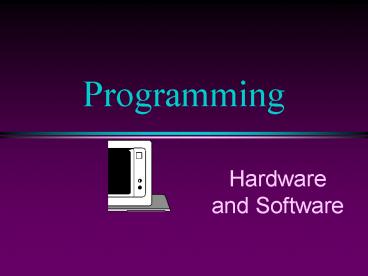Hardware and Software PowerPoint PPT Presentation
Title: Hardware and Software
1
Programming
- Hardware and Software
2
Hardware and Software
- Why should we bother with hardware, while we are
having a programming (software) class? - software drives hardware
- having some understanding on h/w helps us produce
more efficient programs
3
Hardware
- Four components of a computer system
- CPU - central processing unit
- Makes decisions, performs computations, and
delegates input/output requests - Memory
- Stores information
- Input devices
- Gets information from the user to the computer
- Output devices
- Sends information from computer to the user
4
Hardware
Primary and Secondary
5
CPU
- Core component of the computer
- Arithmetic/Logical Unit (ALU)
- performs arithmetic operations
- Control Unit
- decodes and executes instructions
- Data and instructions are encoded in the binary
number system 0110 1101 1100 1111 0001 - CPU Examples
- Pentium
- Pentium Pro
6
Input and Output Devices
- Accessories that allow computer to interface with
user - Common input and output devices
- Speakers Mouse Scanner
- Printer Joystick CD-ROM
- Keyboard Microphone
7
Memory
- Secondary Memory
- relatively stable storage (e.g. CD)
- slower retrieval time
- often allows sequential access only
- Primary Memory
- main memory in a computer
- aka random access memory, or RAM
- faster (random) access with
- transistor technology
- address location
8
Memory
RAM in computer
Program
double distance double time double
speed speed 27.3 time 4.8 distance
speed time
1000 1008 1016 1024 1032
lt- distance
131.04
4.8
lt- time
27.3
lt- speed
9
What is so Random?
program
RAM in computer
char grade B,D,C, E,D,A cha
r student_grade student_grade grade3
255 256 257 258 259 260
lt- grade0
1024
lt- student_grade
E
10
Software
- Application software
- Programs designed to perform specific tasks and
are easy to use - System software
- Programs that support the execution and
development of other programs - Two major types
- Operating systems
- Translation systems (compilers linkers)
11
Application Software
- Application software has made using computers
easy and popular - Common application software
- Microsoft Word, WordPerfect
- PowerPoint
- Netscape, IE
- PhotoShop, Photo-Paint
- Quick Time
12
Operating System
- Controls and manages the computing resources
- Examples
- MSDOS, Windows, Unix
- Important services that an operating system
provides - File system
- Memory management
- Commands to manipulate the file system
- Input and output on a variety of devices
- Window management
13
Translation System
- Set of programs used to develop software
- Types of translators
- Compiler
- Linker
- Examples
- Microsoft Visual C, Borland C, g
14
Software Development
- Major activities
- Editing (to write the program)
- Compiling (creates.obj file)
- Linking with compiled files (creates .exe file)
- Object files
- Library modules
- Loading and executing
- Testing the program
15
Integrated Development Environments
- Combine all of the capabilities that a programmer
would want while developing software (VC) - Editor
- Compiler
- Linker
- Loader
- Debugger
- Viewer
16
Our First Program
Preprocessor statements
// a simple program include ltiostreamgt use
namespace std int main() cout ltlt "Hello
world!" ltlt endl return 0
Comments
Function named main() indicates start of program
Print statement
Ends execution of main() which ends program
Function
17
Summary

